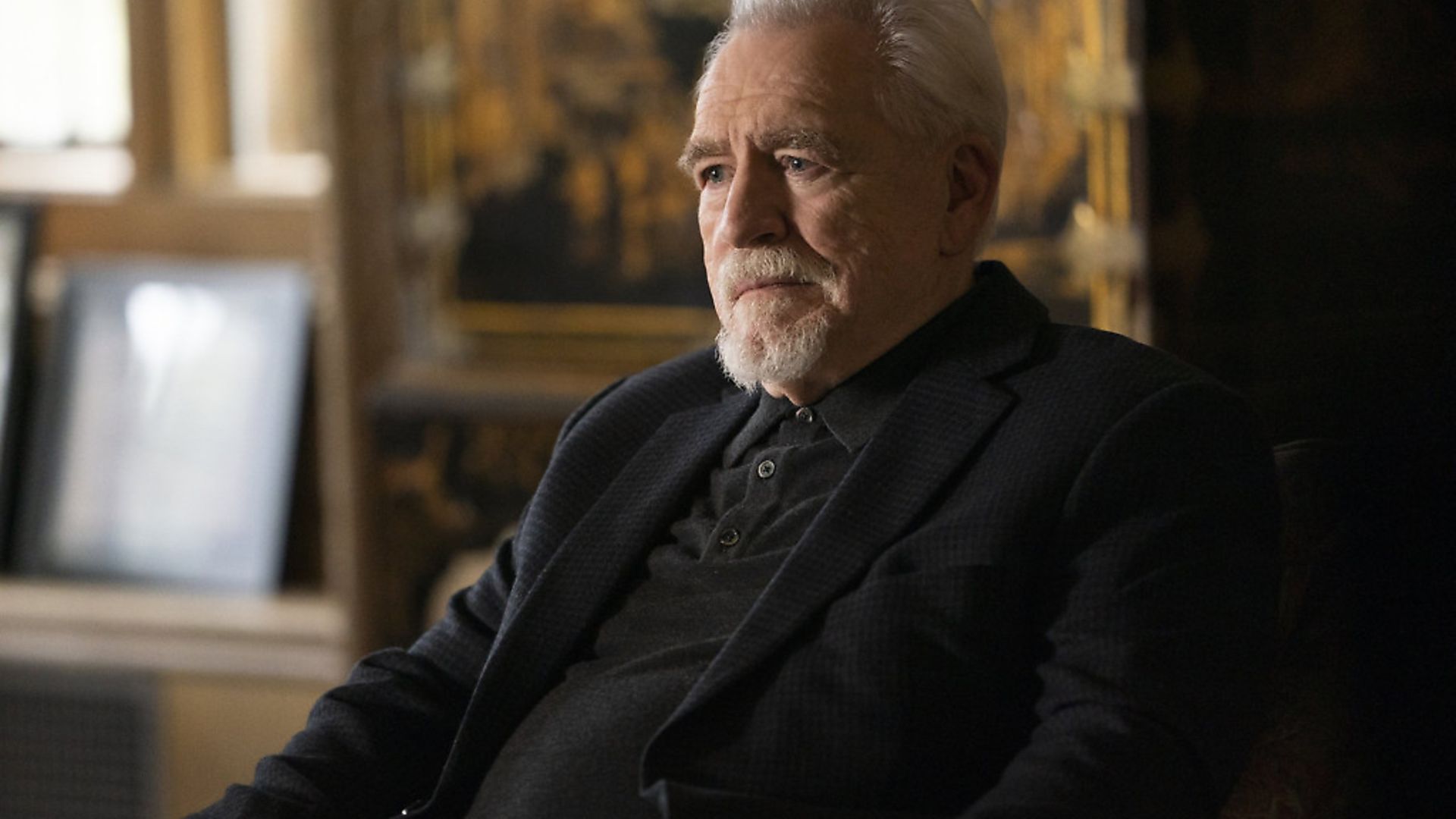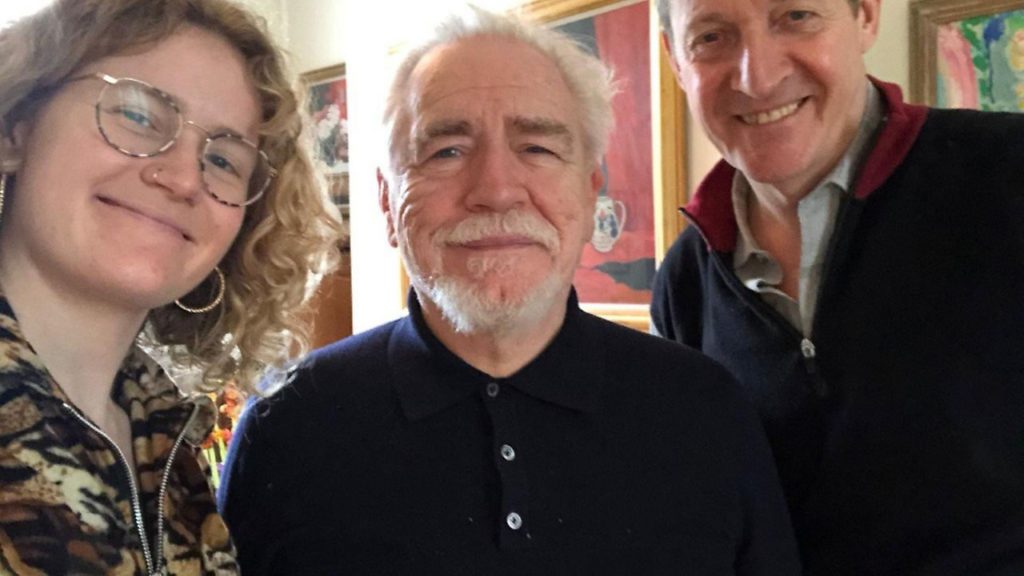
ALASTAIR CAMPBELL meets the actor Brian Cox, to discuss Brexit, Scottish independence and swearing techniques.

We love Brian Cox in our house. We loved him before he became a passionate supporter of the People’s Vote campaign, and loved him even more after. We loved him before he was a guest on the podcast I do with my daughter Grace, and we loved him even more after several hours in his little Primrose Hill flat recording his views and anecdotes from his long and successful career.
We love him in Succession, where he plays media mogul Logan Roy, a man obsessed by his wealth, and the power in politics that his media moguldum gives him. And if there were not enough Rupert Murdoch resonances in that short observation, Roy has several egregious and ambitious children he plays off against each other as they battle for his approval and pole position in the Succession stakes when – at times one senses they are willing it on – he dies.
Though he sees the parallels, Cox is keen we should understand a huge difference between Roy and Murdoch. “Logan” – note the first name terms with his character – “made himself. Murdoch was born into it, like Logan’s kids were, like Murdoch’s kids too, like Trump.”
“Is that why he is so horrible to them?”
“You see him as being horrible to them?” asks Cox.
“I do. Vile.”
“He does love them, you know. He really does.”
“So why is he horrible to them?”
“He is disappointed in them. But he loves them.”
“Does he resent them having been born into fame and wealth and success, whereas he had to struggle?”
“Yes, he does. But then he knows they had no choice.”
“Does Logan have a favourite of the kids?” Grace asks, like all kids do from time to time.
“Probably Shiv. The father-daughter thing is very strong with him.”
We love Brian Cox’s back story too. Born in Dundee, the son of a grocer who died when Cox was eight and a mother who had a series of nervous breakdowns and spent considerable time in asylums undergoing ECT, so that young Brian was largely raised by three older sisters. We love that despite those poverty porn elements to his childhood he speaks of it with warmth and love and gratitude for the values it bred in him and what it taught him about the power of community.
We love that he was aged two when he had the first sensation that he wanted to be an actor. “I was the entertainer in the family. They would give me a box and I would stand on it and perform. One of my first memories was of being on that box singing an Al Jolson song and making everyone happy.” We love that “I never became a ‘luvvie'” and that he hates how the arts has once more become so much the preserve of the rich and the privately educated. We love how proud he is that he made it with the help of a grant and how he lists his artistic heroes as working-class writers David Storey, Alan Bennett, Alan Sillitoe, and working-class actors such as Albert Finney, Tom Courtenay and Richard Harris.
We love that he still hates Brexit – “a massive act of self-harm” – and that at any mention of it, Boris Johnson, David Cameron, Nigel Farage or any other of its architects, the F word comes flying. “That f**ker Farage… Johnson with all his f**king lies… Cameron, what a stupid f**king thing to do!”
The last time I was in his flat was a few months ago when we were making a film fronted by Cox for the People’s Vote campaign. “I thought we were going to get there, it was so close,” he says. “It makes my blood boil, all the lies, all the promises that aren’t going to be kept. That f**ker Farage with his phoney man of the people act, and Johnson pretending that this is the right thing for the country, when the whole thing was a vehicle for him to become prime minister. Brexit makes me so sad about what we have become as a country, and now all that rubbish about Big Ben bongs and new 50p coins and Johnson saying ‘let’s all put it behind us and get along together’. F**k off!”
We love that he defends the expressive power of well-used swearing. He swears almost as much as Logan Roy, who may not beat Malcolm Tucker when it comes to sweary quantity but beats everyone when it comes to quality. Grace films him on her phone as he takes her through the four basic uses of “f**k off”. The standard “F**k off”, neither soft not hard. Then full-on, loud, lingering… “F**kooooooooooofffffffff”. Then nasty, eyes narrowed, face mean, voice harsh, the expletive sharp… “F**kaawf”. Finally, his favourite, what he defines as “Scottish weary”, dismissive, almost uncaring… “oh just f**k off”.
Our love-in has just a couple of wrinkles in it but he explains them so nicely that there is no love lost. He was an active and committed Labour supporter all his life, until – “you won’t like this,” he warns me – the Iraq War. Unlike some in the party, however, he does not denounce Tony Blair and all his works because of that one decision and can reel off Labour achievements better than any of the current candidates to succeed Jeremy Corbyn.
He tells us he recently watched the interview I did for GQ with Tony online. “It was absolutely fascinating, because you obviously know each other so well. I could see in a way I hadn’t seen before his dilemmas, and I could see yours too. There was a part where you were trying to get him to say something bad about Trump and he just wouldn’t go there. He said something about ‘having to work with everyone’ and I could see you wanted him to break free, but he wouldn’t and it felt stunted, I found it sad, a bit tragic even. I remember him winning in 1997 and just feeling this was such a fantastic moment. And it was, and that Government did a hell of a lot of good, things were so much better then, but I just wish he hadn’t done Iraq, I really do.”
An atheist raised as a Catholic, he adds for good measure: “He’s also got all that religious crap going on, hasn’t he? That doesn’t help.”
As for Labour today, he is baffled at the nature of the debate about who should succeed Jeremy Corbyn. The whole Corbyn project, he says, was clearly a failure, and yet the contenders do not appear to want to say so. “If Rebecca Long-Bailey takes over, it means they have learned nothing,” he says. “But I would prefer a woman. I don’t like Keir Starmer. Too much a lawyer. I much prefer Lisa Nandy. She seems to me to get it more.”
The other wrinkle is Scottish independence, though here too we find ourselves closer than perhaps once we might have been. At the 2014 independence referendum I really struggled to see why Scots would want to go it alone. Brexit, to such a large extent the product of English nationalism, and Johnson as PM with a majority dependent entirely on England, changes the equation somewhat. Also, Cox insists that despite wanting independence he does not see himself as a nationalist. Indeed he tells us he wishes the SNP would change its name to the Scottish Independence Party. “I am an internationalist. I think wanting Scotland to be an independent country in Europe is compatible with that. The whole damned Brexit thing has been about English nationalism. If I felt Scotland could be an independent country in Europe, that would be my ideal now. The idea that this Government has the faintest clue or interest in Scotland – forget it.”
He goes further, describing the attitudes of Old Etonian Johnson and his like as “feudalism… this is the whole problem with Britain. It is f**king feudal. “Know your place. Don’t step out of line. You belong THERE!” These f**kers are so f**king entitled. The people are just pawns for them. And it has been like this forever. You just get the odd period, like we had with you guys, when it feels different for a while, but then they come back. It is so depressing. That’s why Scotland has to go it alone. We get held back by it again and again.”
Listen to Alastair and Grace Campbell’s podcast, Football, Feminism and Everything In Between, on all usual platforms










